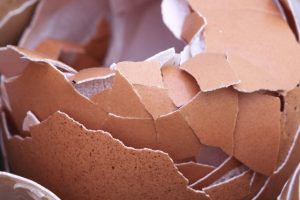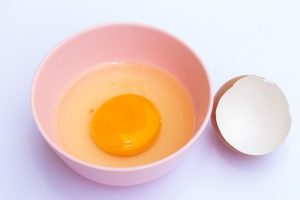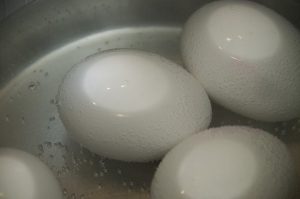Getting calcium into a squirrel has its challenges. Egg shells could be the answer if done properly.
Hopefully this resource puts you on a path toward reducing risk by adopting the best practices we already know about egg shells and calcium.
Table of Contents - Click to Open
Can Egg Shells Provide Calcium to Squirrels?
Whole eggs, including the shells are common ingredients found in pre-packaged, pet squirrel foods. Egg shells are loaded with calcium and when properly handled, can be a great Ca source for squirrels and other wildlife, such as birds and reptiles.

We all know that eggs can carry bacteria and other pathogens, which means it’s important to take every precaution in order to reduce the risks when trying to supplement calcium in a squirrel.
That means feeding squirrels raw, wet, cracked egg shell waste (from your morning pan-fried egg) is not exactly the safest approach.
Risks of feeding raw egg shells to squirrels
The biggest threats of feeding any poultry egg shell to a squirrel would be salmonella, E coli, and campylobacter. There are others, but this triple threat makes up most of the problems associated with chicken eggs.
Good news is, all three can usually be eliminated with high heat or chemical disinfectants.
Since chemicals would be totally unsafe for squirrels to consume. Let’s talk about how we can make egg shells as safe as possible using high heat, cooking methods.
Can Crushed Egg Shells be Given to Squirrels for Calcium?
The shells of chicken eggs are extremely high in calcium. Squirrels need calcium. That’s why squirrels are often found eating the soil of gardeners who use crushed egg shells to enrich their plants with calcium.
Studies show (1) there is so much calcium in chicken egg shells, there is good reason to explore the potential of our scraps.
To a squirrel, gardens loaded with crushed egg shell is nothing short of a jackpot. While most gardeners do wash, scrub and dry out their egg shells, it would be better to take extra steps if you intend to feed eggs shells to squirrels.
For best practices, we include tips to follow for using egg shell waste as a calcium boost for squirrels.
Safety Tips for Offering Crushed Egg Shells to Squirrels
Crushed egg shells for squirrels can be either from raw eggs or cooked eggs. For instance, you can save raw egg shells after you’ve use the egg in baking or making omelets.
And, you can save dry, cooked egg shells that are peeled away from hard boiled eggs. Like when after you make egg salad.
Let’s go over tips for both types of egg shell waste.
Raw, Wet Egg Shell Waste
Throughout this process, it’s easiest to keep the shells in tact or else the shells tend to cling to the dishes and your fingers.

Alternatively, you can pre-crush them into a sieve for easy handling through the washing process.
- Wash – wash shells immediately with a sudsy dish soap. Do this until the shell interiors have no slippery feel to them.
- Soak – Discard soapy water, rinse. Soak 15 minutes in a warm water bath with a little vinegar or baking soda. Jars with lids are ideal because you can shake it up and really blend the acid.
- Rinse – Rinse egg shells from acid bath
- Dry & Keep cold – (optional) if you are saving up to do a full batch, dry the cleaned shells and store them in a container or zip lock in the fridge for no more than a few days. Otherwise, move on to : heat
- Heat – boil or bake your clean egg shells. Bring water to boil and boil a full 15 minutes. Or bake in a pre-heated oven for 300°F for 15 minutes
Dry, Cooked Egg Shell Waste
If you peeled a whole bunch of hard boiled eggs for human consumption, but want to keep the calcium rich shells for squirrels, it’s better to repeat a heating process.
That’s because when we cook hard boiled eggs for ourselves to eat, the boil time is usually about 5-7 minutes which means we are a little shy of the recommended times for heating shells to remove contaminates.
- Acid Bath – Unless you already did this before boiling your eggs, peel the eggs and drop the shells right into warm water with a little acid such as vinegar or baking soda. This will help remove the interior membrane that tends to stick to egg shells. Let them soak 10 minutes
- Rinse – thoroughly rise shells from acid bath
- Heat – spread the egg shells onto a cookie sheet and bake in a pre-heated 300°F for 15 minutes.
- Cool – completely cool the egg shells in an area free of dust and flying kitchen debris
- Crush & Store – Crush the shells. Heavy duty plastic bags can take rolling pins quite well. Move the shells to an airtight container and keep in a cool, dry place.
Feeding Squirrels Hard Boiled Eggs with the Shell
For squirrel feeding, the cooking time for boiled eggs is longer than what humans like. Essentially, the eggs will be far more rubbery and the yolks will go toward green. But most squirrels don’t mind.

Safety Tips for Feeding Hard Boiled Egg With Shells to Squirrels
It may seem straight forward, but there are things you can do to reduce potential contaminates handing out on the exterior of chicken egg shells.
And taking every precaution is the preferred way to introduce calcium rich egg shells to squirrels.
- Pre-soak: Prior to cooking, presoak raw eggs in a warm (not hot) water bath with a little vinegar or baking soda. A 10 minute acid bath is not guaranteed to kill all pathogens, but studies show it can significantly reduce or even eliminate weaker contaminates.
- Rinse thoroughly
- Cook: Boil the eggs in a low boil for at least 15 minutes. While it doesn’t take that long to hard boil an egg, 15 minutes is a good amount of time to kill more resistant bacteria.
- Refrigerate immediately after cooling.
- Feed: Prior to feeding squirrel, cut the hard-boiled egg in half and make sure it looks like a nice, healthy egg. If so, offer it to the squirrel with the shell attached.
Notes: Yolk are optional. Squirrels love them, but maybe skip the yolks for fat, well-fed squirrels. Yolks have way more phosphorus to calcium and that will tip the scales, unfavorably.
In Summary
Squirrels definitely get calcium from shells and other natural calcium sources in the wild.
If you’re going to try giving egg shells to squirrels, it’s only fair to do everything in your power to remove associated risks.
But remember, even harsh chemical disinfectants cannot claim 100% elimination of harmful bacteria associated with poultry eggs. At the end of the day, anything could be risky. Toxic peanuts, recalled formulas, rancid suet, moldy feed, etc.,
The goal is to significantly reduce the potential for contaminates, using best practices listed above.

